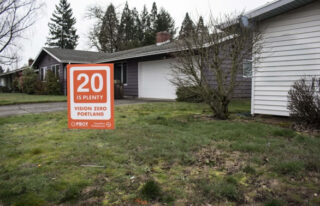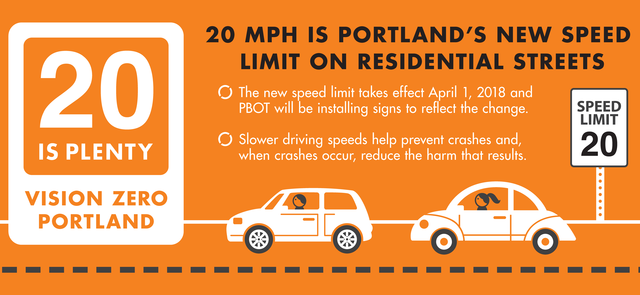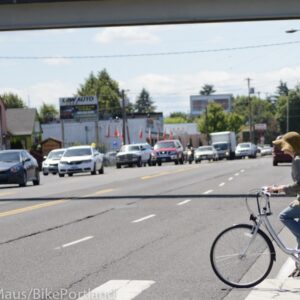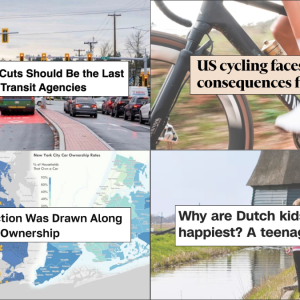
(Photo: PBOT)
Changing America’s dysfunctional traffic culture begins on the street in front of where you live.
It will take a lot more than signs and paint to win the battle against traffic violence — but both of those things are part of the fight. The Portland Bureau of Transportation has a new way you can aid their “Vision Zero” efforts: They now offer free ’20 is Plenty’ yard signs. Their goal is to help educate us about speed and give everyone a bit of a fair warning before the new 20 mph citywide residential speed limit goes into effect on April 1st (no foolin’).
Here are the times and places you can pick up a free sign:

➤ Northeast: Saturday, Feb. 24, 9:30-2:30 p.m., Madison High School, 2735 NE 82nd
➤ Downtown: Feb. 26-Aug. 31, Monday-Friday, 8 a.m.-5 p.m., City of Portland Bureau of Transportation, Congress Center Building, 1001 SW 5th, Suite 500 (5th floor)
➤ East: Saturday, March 3, noon-4 p.m., Midland Library, 805 SE 122nd
➤ East: Saturday, March 10, noon-4 p.m., Zenger Farm, 11741 SE Foster
➤ North: location being confirmed, check back soon
➤ Southeast: location being confirmed, check back soon
➤ Southwest: Saturday, March 31, noon-4 p.m., Multnomah Arts Center parking lot, 7688 SW Capitol
➤ Northwest: location being confirmed, check back soon
Check out PBOT’s website to stay in touch with this effort to make speeding a dirty word in Portland.
— Jonathan Maus: (503) 706-8804, @jonathan_maus on Twitter and jonathan@bikeportland.org
Never miss a story. Sign-up for the daily BP Headlines email.
BikePortland needs your support.







Thanks for reading.
BikePortland has served this community with independent community journalism since 2005. We rely on subscriptions from readers like you to survive. Your financial support is vital in keeping this valuable resource alive and well.
Please subscribe today to strengthen and expand our work.
Can I get a sign that suggests 20 is way too fast for my narrow, single-lane street bordered by end-to-end parked vehicles?
This weekend I biked over from downtown Beaverton to the Fanno Creek Trailhead at Denny to see if the middle school construction had improved across and down Denny, it had but on the way I saw three different little speed warning trailers set out on residential streets in the Vose neighborhood to remind people of their speed and tell them to slow down. Since we don’t seem to do much speed enforcement in Portland maybe a few dozen of those scattered around would help shame the scofflaws in to obeying the new law. The ones I saw in Beaverton were almost small enough to tow around with a bike.
On my commute through Beaverton I noticed that one house has the speed limit painted on their garbage can, which I thought was a great use of otherwise wasted space. A nice weekly reminder for the cut-through traffic.
Whenever you pass a law that is dramatically different than common practice, you can guarantee it will not be effective. Make marijuana illegal, no effect. Tell young people they cannot smoke cigarettes, no effect. Tell people who have been driving 35 mph that they cannot go over 20 mph, no effect. In Bend, there are a couple of sections of road on Franklin and Greenwood that are posted at 25 mph; average speed probably 40 mph. Number of times in the past 10 years that I have seen anyone pulled over…..zero! Impractical laws lead to predictable outcomes.
Seriously. Look at the way seatbelt laws flopped.
Or No Smoking in restaurants
I couldn’t disagree more, Steve. Rome was not built in a day. Let’s walk before we tell ourselves how disappointed we all are that no one’s running.
Not so long ago we told ourselves that reducing the speed limit Or having speed cameras on our streets) were both impossible; perhaps we’ll crack the enforcement nut yet.
People have slowed down on BH Highway by the safety cameras.
Enforcement is the solution. Saturation enforcement and STIFF FINES. Stiff fines could pay for the entire police budget including added staff (and courts) for processing. Rather than a 250 dollar fine, how about 2,500? Even 25,000? Turn the system into an assembly line. Let’s go!
What, no guillotine?
I have been tempted to go that route with people who little the Right of Way I maintain at my house.
Cities in Oregon are flat-out unable to hire enough officers, and, with increased pain from PERS expenditures, there is not going to be enough money to fund adequate policing. At least, in our lifetimes.
I was passed by a Sheriff doing at least 20mph over the speed limit this weekend. I wonder if we could somehow get the police to start obeying the speed limit from time to time.
If we could just punish speeding violations they way they punish public gum chewing in Singapore the problem would be solved.
Enforcement isn’t the solution. Changing the culture, and street design is.
Agreed, but enforcement is part of changing the culture.
Perhaps a progressive fine structure, starting at a base fine and increasing in cost by steps, indexed to the Kelly Blue Book value of the car. (The base fine might even be much lower than the current fine, which could begin to address some of the concerns around the socioeconomic impacts of traffic fines.)
(I’ve read before that some country/ies in northern Europe (Finland?) levy progressive traffic fines, tied to the offender’s income (or wealth). That introduces privacy and other complications (fraudulent evasion…) in this country that could be easily avoided by tying the increased fines to the value of the vehicle. Cop looks up the car in a fine structure, says “2017 BMW x3, well, that puts you in a Tier 6 fine, so that 15 over is going to cost you $1,800 today.”
I’d be interested to hear from some lawyer types on whether tying the punishment to a factor unrelated to the crime (type of car) would fly. Our legal system is built on the premise of equality under the law, and using variable punishments like this would seem to me (not a lawyer type) to violate that principle.
By the same token, a speeding ticket of, say, $250 is nit an equal punishment for someone earning $9/hr versus someone earning $100/hr.
That $250 coukd land the minimum wage earner in collections, or zeroing out their bank account, maybe missing rent or worse.
That same $250 might be barely a slap on the wrist for the rich guy.
So one xould argue that an unequal punishment, in this context, is fair, and upholds the intent of the law.
I do second your request for actual lawyers to weigh in, though.
Which is exactly the argument underlying the day-fine approach folks have outlined here and which works very well in a bunch of European countries.
https://en.wikipedia.org/wiki/Day-fine
A year in jail is an unequal punishment for someone with a family than it is for a single person; it is also more expensive for a doctor than for a day laborer. Should prison terms be calibrated for “equality”?
The question of whether it would fly legally remains unanswered.
Come on. Smoking rates were above 50% a generation ago, and are under 20% now.
What about legalizing car theft until Vision Zero is achieved?
It wouldn’t even need to be legalized, just enforced the way that speeding is now.
Cue broken record: without a noticeable uptick in enforcement, nothing will change. This will only notify those who already intend to drive carefully of the change.
Culture works via carrots and sticks. Portland has an abysmal lack of enforcement and that Portland, the PPB, and PBOT will not respond to a horrific increase in deaths with a proportional increase in enforcement is criminal.
If this increase in deaths was happening on private property, Disneyland for example, and the response from Disney was, “We can’t increase security because our security force is racist.” People would lose their ever-lovin’ minds. That’s what Portland is doing.
I know that if a loved one of mine were injured or killed by a speeding driver, I would pursue every legal avenue to hold Portland financially responsible for their neglect.
And to be clear, I fully agree that our police traffic enforcement is terribly racially biased. I just also think that putting a freeze on increasing enforcement without accompanying substantive change within the force is merely reframing neglect as a solution.
is there a way to measure the degree to which something is biased? I mean, can it be “mildly” biased?
It’s not “mildly.”
African Americans are pulled over at twice the rate of their representation in the population, and twice again as likely to be searched despite being less likely to be carrying contraband than whites.
http://www.oregonlive.com/portland/index.ssf/2015/01/portland_police_traffic_stops_1.html
Thank you for linking to that piece. I’ve linked to the report on Multnomah County’s report here in the comments before. It is dreadful.
http://media.oregonlive.com/portland_impact/other/RRI%20Report%20Final-1.pdf
http://www.oregonlive.com/portland/index.ssf/2016/02/blacks_overrepresented_in_ever.html
The article also notes that the traffic division is much better than the police as a whole, so reducing their efforts is unlikely to make a big change in the overall statistics, which are, I agree, dismal.
It also suggests to me that traffic enforcement itself is not the problem, but using traffic infractions as a pretext is. Which kind of makes sense.
PPD will often publish reports that include “gang enforcement officers initiated a traffic stop”.
ppb. Also, traffic cops don’t carry guns in 1st world countries.
I agree — hellholes like Denmark (where all police are armed) are hardly fit for human occupation.
Pinning our hopes on little signs seems a bit toothless.
Income-based fines, I think, would do wonders to motivate better driving.
If you can’t help but to drive your $130000 mercedes G-class at 40mph in a 25mph zone, that’s cool, but you get to pay 25% of your monthly income as a fine.
Other option I’d love to see is speed camera activated speed bumps that jump up from the grade 1-3 inches.
Going the spees limit? Smooth sailing.
5mph over the posted speed? You’re getting a nice jolt.
How fast do you think people would slow down after hitting a square edge at 40mph?
Ken, I didn’t see your comment before posting a response further up-thread. If you make it tied to the value of the vehicle instead of the driver’s income, you avoid all kinds of privacy and accurate-information issues, and make it very easy to establish the level of the fine on the spot.
I really like that idea. I totally get the privacy/identity fraud concerns around income-based fines.
Certainly, whatever fine structure is used, I would want to avoid overburdening people in low income brackets. Like how a $95 parking ticket can literally ruin someone’s life, if they’re living paycheck to paycheck at minimum wage, but someone earning $200K/yr just cuts a check and treats it as an inconvenience charge for their laziness.
I like imagining someone in a clapped out Ford Explorer, briefly ignoring their speed, getting pulled over:
Officer – “Kelly blue book puts your vehicle at around $750, so that’ll be $5. Cash and coins accepted. Please drive more carefully, next time.”
And I would LOVE to see all the impatient commuters blasting through my neighborhood (35+ in a 25) get charged $1800 per infraction!
Personally, I want to see people speeding caught speeding to have a really bad day. I don’t think the price of a beer would cut it.
I think speed activated cameras could work, ticket the vehicle owner..
Second time the same vehicle is speeding, fine is automatically doubled…
Third time, fine is tripled and car impounded till fines paid..AND the tickets are put on the drivers record.
If fines not paid, owner has to pay when renewing license or registration!
I fail to see how a speed activated camera could be “racial profiling”…
I agree — hellholes like Denmark (where all police are armed) are hardly fit for human occupation.
Passive-Aggressive signs giving truly no indication of what’s even being referred to are NOT the way to enact/enforce new legislation.
Are you referring to anything in particular? Care to fill in the gaps?
Someone stole my sign yesterday.